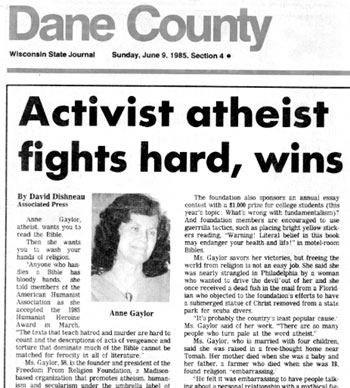Michael Hakeem, professor of sociology emeritus at the University of Wisconsin-Madison, served on the governing board of the Foundation’s Executive Council and was its chairperson for many years. He was also a hands-on volunteer for a decade along with his wife, the late Helen Hakeem. Today he is 88 and confined to a wheelchair in a nursing home.
Mike composed an accolade to be read at the tribute for Anne Nicol Gaylor, retiring founder and president of the Freedom From Religion Foundation, at its 27th annual national convention on Oct. 29, 2004. Below is an excerpt:
By Michael Hakeem

Michael Hakeem
Photo by Brent Nicastro |
We are gathered here to pay tribute to Anne Nicol Gaylor, who is retiring after 28 years as president of the Freedom From Religion Foundation. Although she is formally retiring, her knowledge and wisdom will not be lost to FFRF. She has graciously consented to serve as an adviser and consultant to the officers and staff of FFRF.
She established FFRF in 1978, starting with a handful of supporters, and nurtured it to a nationwide membership of more than 5,000.
Anne told me that people predicted that FFRF would last only a few months, or, at the most, for a few years. Well, she had the last laugh, since we are celebrating its 27th annual convention.
Her entrepreneurial skills include starting the first employment agency in Dane County, and running an award-winning newspaper for several years. Her previous activism had been for women’s rights, population control and reproductive rights, especially for the poor.
Although Anne has not lost her interest in the other causes she had been involved in before founding the Freedom From Religion Foundation, she has devoted herself largely to FFRF. She is a staunch advocate of the First Amendment and has made it her business to prevent and correct violations of that principle of the separation of church and state. What she is all about in regard to this endeavor is best seen in the litigated cases of violations.
One memorable early lawsuit was Gaylor v. Reagan, in which FFRF challenged a resolution by Congress to declare 1983 to be “the Year of the Bible.” Although the lawsuit was declared moot after Reagan signed the proclamation, it delayed his signing of the bill for several months, and modified the language. Most importantly, the lawsuit engendered publicity around the nation on the pitfalls of the bible.
As administrator of the charitable Women’s Medical Fund, which has helped more than 14,000 needy women in Wisconsin obtain abortion care, Anne soundly won Gaylor v. Hanaway. In 1989, then-Wis. Attorney General Donald Hanaway unlawfully signed the State of Wisconsin to a friend of the court brief before the Supreme Court in support of overturning Roe v. Wade. Hanaway was forced to withdraw the brief. It was a politically important case here.
I will list only some of the cases of the last decade:
FFRF won its challenge of Wisconsin’s Good Friday state holiday in 1996. Our lawsuit overturned a 1945 law mandating worship and closure of public offices on Good Friday.
FFRF won a nationally watched lawsuit declaring Wisconsin’s creation of a post to “assist clergy” unconstitutional, the so-called “Marriage Savers” case, in 2000.
FFRF won a decision at the 7th U.S. Circuit Court of Appeals ruling direct subsidy to parochial schools unconstitutional in 2000.
FFRF took and won the first fully adjudicated federal lawsuit challenging direct funding of a faith-based agency, Faith Works of Milwaukee, in 2002.
FFRF won “Scopes II,” before the 6th Circuit Court of Appeals, halting 51 years of unlawful bible instruction in Rhea Co. (Dayton, Tenn.) schools, this summer.
Just this past week, FFRF won its federal lawsuit in Montana, in which faith-based nursing through the “Montana Faith-Health Cooperative” was funded and merged with two Montana state offices.
Anne leaves behind her a great record of accomplishments in doing what she sought to do.
But it is not all litigation. Those who read Freethought Today will recall seeing the exchange of correspondence between FFRF and violators of the First Amendment, under the title, “It pays to complain.” Sometimes a gentle, polite letter reminding officials that they are violating the First Amendment, a longtime principle of American democracy, will result in compliance.
Anne–I’m sure that I speak for all of us when I wish you a happy and comfortable retirement. You have done a great service for our society, so vigorously defending the constitutional edict to keep church and state separate.
 |

